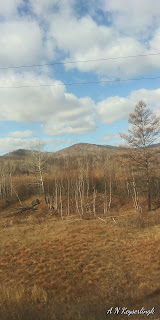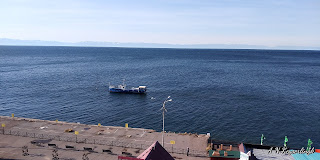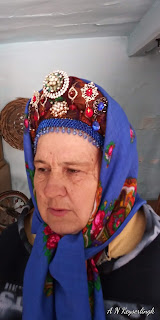Chapter 12 Train ride across Russia, Final thoughts. October 2019
Pictures of this chapter can be seen at:
https://photos.app.goo.gl/HnxgTBvCsasrDFQNA
I am writing this as we approach Vladivostok on the last leg of some 8 or 9 legs about which you can read in the earlier chapters. As you can gather from reading these chapters, we were not impressed by the quality of the trains and even less by the quality of the service and food.
The distance between St Petersburg and Vladivostok is 5500 miles which is almost exactly the distance in Canada between St John's Newfoundland and Victoria, BC. The trip in one stretch would take 6 days and 7 hours. Between St Petersburg and Moscow, there is a high-speed new train but then one is on trains which stop at least 62 times between Moscow and Vladivostok. The stops are mostly for 15 to 20 minutes in desolate places where there is nothing to see and less to do except some 8 big cities. The cost of a first-class ticket runs about US$1000. The reason this trip takes so long is first the many stops but mainly the poor state of the rolling stock and the very dilapidated state of the rail track on almost the full length of the trip. A high-speed Chinese train would do this trip in 1 and a half days if there were no stops and the track had been laid by the Chinese, using their modern technology
The rail cars in first-class vary from very basic to basic and apparently are mostly made up of 1960 rail equipment from the former East German People’s Republic or DDR. The DDR was not known as a leader in very much but certainly not in trains. The sound insulation is poor, the suspension systems throw one from side to side and the rails are totally out of line. The inside of the first-class cabins consists of two benches facing each other with beds that come out of the wall and are hard and hardly 2 feet wide. There is a table in the middle under the window. Sitting is very uncomfortable as the area where the bed lives are then empty giving no back support whatsoever. If one hits the jackpot there may be 1 plug in the car which is usually placed under the central table and difficult to access without crawling under the table or doing bending gymnastics to put in one’s plug. If, like most people you travel with a phone and tablet, you had better have a multiple wire charger as you only get one plug. On one leg, the only plugs were 2 in the corridor for all 10 first-class cabins! Luggage fits under the seats if it is no more than 12 inches high. The bedding was given once for the 3 nights trip from Ulan-Ude to Vladivostok.
 |
| Typical landscape in Southern Siberia. |
Some 80 % of transport in Russia is by rail so that the view one has out the window is of one, sometimes two, trains passing in different directions with 100 or more cars of different freight or oil. Obviously, freight trains have priority which resulted in our train often being shunted off to the side to let a freight train or two passes by. The whole system is owned and managed by the state and the rolling stock is not only old but it is dirty and poorly maintained with wagons going back 40 or 50 years. There seems to have been little or no investment made in the system in many decades. The track is mostly made of non-welded hand-laid lengths which were badly laid or have been used so much that one can hardly say they are still aligned. The result is that the train wagons sway madly from side to side, squeal loudly when going around a corner and require drastic slow speeds in certain areas. At times, we traveled at about 40 or 50 km/h for long stretches. At no time did we do more than 72 miles an hour. Chinese trains travel at 180-220 miles per hour. There is only one track in each direction most of the way and there are no express trains in China that cover vast distances with few or no stops. Another unpleasant feature is the apparent rough braking done by the drivers which result in one being thrown forward and slamming against the wall.
 |
| This is the hot water container so one can make soups or tea. |
 |
| Old technology for Russian trains. |
There are two ancient toilets at the end of the car with a steel basin and an ancient type of sit-down toilet dating back to the ’60s. They are kept clean by the wagon steward who has always been a middle-aged woman who speaks not a word of English or any other language but Russian. These women also sell snacks, souvenirs, and cups of coffee made on what seemed their own espresso machines. They travel huge distances and are on the trains for days on end. As a result, they are tired and not always very pleasant.
 |
| Looking into the dining car at a couple of Russians having a liquid breakfast at 9 AM. |
Sleeping in this state of affairs is an acquired art and results in uncomfortable sleep while being thrown left and right and sometimes back and forth. Some in our team slept very little. I managed to get a few hours each night but sleeping on such hard surface results in sore limbs in the mornings. The air in the cabin was alright except one night when the steward decided to put on the heat and the temperature rose to almost 25 degrees, 80 in Fahrenheit.
Views out of the windows tend to become monotonous as most of Russia is as flat as a pancake as can be seen above. Surprisingly, there are vast tracks of fields with no agriculture to be seen. Huge areas are unused and one sees little commercial farming anywhere in the country. One sees a few hills as one crosses the Ural chain but that is all until the far east when one sees the first tunnels along the way. Birch trees dominate the forests but one sees hardly any which are more than 20 cm or 5 inches in diameter. The birch trees stand like toothpicks and are usually no taller than 20 feet.
The most depressing things one sees are the dirt poor state of the villages all along the ride. Little unpainted and dark log houses bunched together with wooden fences around little gardens growing vegetables. They seem to have electricity but no running water. Dirt roads are everywhere. Many of these settlements house rail workers who do maintenance and repairs on the track. I presume they are supplied with food by the rail company as there do not seem to have any stores in the villages. The houses are all rundown and in need of repair and are being heated with wood or coal which adds to the pollution in the countryside and even more in the cities. I read that many of these villages are being abandoned by the inhabitants who move to the cities to seek their lives. The curse of oil and gas in Russia has meant that the government has money to spend on imports of food and other needs, thus killing agriculture and small businesses throughout the country. These villages are depressing to see and must be tragic for people who have lived for generations in them. The contrast between the few big cities and the villages is so great one feels that there are 2 separate countries. I have seen more prosperity in villages in Africa than here in Russia.
With industry shut down everywhere in the country, there is no longer any way to make a living. The current government does not seem at all interested in trying to keep the countryside livable and one sees little or no investment in job-creating initiatives. Everywhere on sees huge empty production facilities, factories, warehouses that used to employ tens of thousands sitting idle and rotting away. Monuments to soviet industrial policies that bankrupted the economy but which have not been replaced by any new and modern industrial policies since the death of communism. One has to feel very sorry for the people of Russia. Exploited for centuries by the Tsars and its so-called nobles only to be exploited again by the party members who lived again off the labor of the same peasants. Now, a new ruling and exploiting class have taken the riches of the country into their pockets and bank accounts leaving nothing for the ordinary citizens.
This, in a nutshell, is what the Trans-Siberian train ride has to offer. One lives through the vast expanses, one sees in the distance the poor villages, one watches vast tracts of land lying idle and one has a feeling of arrested economic development. I really wonder why this Russia is considered by many as a world power. It is an underdeveloped country with a very dark past and an even bleaker future. The amount of money needed to bring this country into the 21rst century will absorb every ruble or dollar they can find. Presently, that money is either being stolen or invested in more new arms to keep the generals from an uprising. Perhaps one should wonder when a leader will appear to take back the power and wealth for the people of this huge and potentially rich country.
Take the train, as it is the only way to get a real feel for the real Russia. Moscow, St Petersburg and some of the big cities are not the real Russia. Flying through the country probably does not let one feel the size of the country. The train does, even if it forces it on one. Just be aware that this is a long and not very comfortable journey. Make the stops on the way, take time to talk to people. It is an investment of time which I think is worthwhile. But it is not easy, not really fun and surely requires more time than most people would want to invest in.
I ask myself if I would want to come back to Russia as I did to China for 7 or 8 years in my China period. Right now I am not sure except if I decide to improve on my Russian language skills. Perhaps with a little distance, I may change my mind. If I were to return it would be to Vladivostok as most other Russian cities have little to offer.
I know that one member of our team will not be interested in returning to Russia. The trip has been hard on her as she got very little sleep on the trains and carried a cold with her almost the whole trip. Also, the fact that so few people here speak anything but Russian put a lot of stress on her as she felt completely uneasy in a very foreign and not so friendly place. Russians are a friendly bunch but if one cannot communicate, that trait does not come out. The food we were offered or that we ordered often was not familiar nor really very good which added to the feeling of depaysement.
It has been an amazing experience and we have learned so much about a country which is a huge unknown. Now, we know it a little more than a few weeks ago.












Vous êtes incroyables avec vos aventures! J'ai adoré te lire! Super intéressant! :)
ReplyDeleteNice read.
ReplyDeleteRussia is a proud culture with a sad history. Siberia has long been part of an empire that stripped its vast regions of their sparse riches, be it resources or young people. In this writing you get a sense of the result.
I am not sure that agriculture is viable in Siberia, where summer is short, winter harsh, and the trees are stunted.